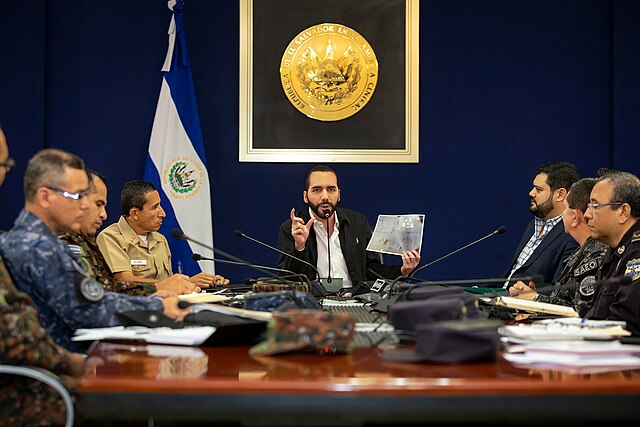In El Salvador, an uncertain future for both gangs and democracy

President Bukele, featured in the center, pictured in 2019, towards the beginning of his first term.
Jonah Carlson - El Salvador’s gangs have long held significant influence over the country’s politics and daily life. That is changing under President Nayib Bukele – but at what cost? In an article with The New York Times, Natalie Kitroeff examines the repercussions of Bukele’s crackdowns on gang violence, and how his actions could significantly reshape the country’s political ideology.
El Salvador’s gangs are an example of how non-state actors can have an incredible influence on a state’s domestic politics, levying strict control over certain neighborhoods and communities. These actions have provoked states to act against the gangs, influencing those states’ geopolitical codes and international behavior. Many attempts in Latin America have found little success in combatting them. Yet Kitroeff notes that the gangs in El Salvador, once powerful, have seemingly been curbed by Bukele’s administration, with both killings and extortion payments dropping significantly. The cost, however, has put human rights and democracy watch groups on alert. Kitroeff reports that around 75,000 people have been imprisoned by Bukele’s crackdown, many of whom are believed to be innocent with no association to gangs or gang violence. This has not seemed to diminish Bukele’s popularity, though, whose approval rating was 91 percent in May of 2023. Kitroeff writes that he likely still holds 80% of the popular support now. Such popularity will launch Bukele into a second term, with his party sweeping elections held in early February, despite the fact that El Salvador’s constitution bans presidential candidates from seeking consecutive terms. Critics have accused Bukele of effectively implementing a dictatorial regime in El Salvador. His vice president, Félix Ulloa, has even said that the Bukele administration was working to “eliminate” democracy and replace it with “something new.” It appears that the physical security the Bukele administration has provided thus far has also given it a boost in ideological power, the ability of states to shape what is deemed acceptable behavior. Bukele’s continued popularity questions the future of democracy in El Salvador, and whether such a concept will be prized by El Salvadoran votes in the future. For now, it appears that security and curbing violence are priorities.
How do Bukele’s reforms and crackdowns affect El Salvador and its region geopolitically? Kitroeff notes that gang violence in the country has previously caused surges of migration northwards, especially towards the United States. With immigration being a hot topic in the United States, especially as a presidential election approaches, it’s clear Bukele’s policies can have political ramifications far beyond the boundaries of El Salvador.
Photo source. Casa Presidencial El Salvador, CC0, via Wikimedia Commons.

